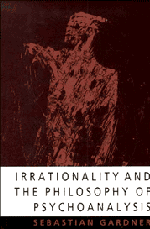Book contents
- Frontmatter
- Contents
- Acknowledgements
- Note on the text
- Introduction
- PART I DIVIDING PERSONS
- PART II PSYCHOANALYTIC CONCEPTS
- PART III PSYCHOANALYTIC CONCEPTION OF MIND
- 7 Metapsychology and psychoanalytic personality
- 8 Consciousness, theory and epistemology
- Appendices
- Notes
- Works of Freud cited
- Bibliography
- Index
7 - Metapsychology and psychoanalytic personality
Published online by Cambridge University Press: 21 October 2009
- Frontmatter
- Contents
- Acknowledgements
- Note on the text
- Introduction
- PART I DIVIDING PERSONS
- PART II PSYCHOANALYTIC CONCEPTS
- PART III PSYCHOANALYTIC CONCEPTION OF MIND
- 7 Metapsychology and psychoanalytic personality
- 8 Consciousness, theory and epistemology
- Appendices
- Notes
- Works of Freud cited
- Bibliography
- Index
Summary
Quite often human beings do things which seem literally unbelievable. But isn't this because we nearly always fail to cast the right sort of psychological light on our spontaneous decisions and examine the mysterious birth of the reasons that made them inevitable? […] Many would rather refuse to acknowledge an action than trace the bonds and tortuous links which join one element to another, secretly, in the mind.
BalzacMETAPSYCHOLOGY I: FREUD'S STRUCTURAL THEORY, AND THE CONCEPTS OF EGO AND INNER WORLD
This chapter serves two purposes. First, it examines the metapsychology of Kleinian explanation. Metapsychology – Freud's term for a viewpoint which unifies all aspects of psychoanalytic explanation, ‘the consummation of psychoanalytic research’ – may be understood as concerned with the conditions of possibility of psychoanalytic explanation. Second, the chapter considers some of the broad consequences of psychoanalytic explanation for our view of human personality. In this section I will consider some important features of Kleinian theory, and indicate how they facilitate revisions of some of Freud's concepts.
Freud's later topography of id, ego, and superego, known as the ‘structural theory’, which superseded the topography of Cs., Pcs. and Ucs., anticipated and laid the grounds for Kleinian theory. I will try to show how the structural theory can be understood in Kleinian terms.
The structural theory's tripartite picture of ego, id and superego relates these elements to one another somewhat as different stages in mental processing.
- Type
- Chapter
- Information
- Irrationality and the Philosophy of Psychoanalysis , pp. 175 - 206Publisher: Cambridge University PressPrint publication year: 1993



